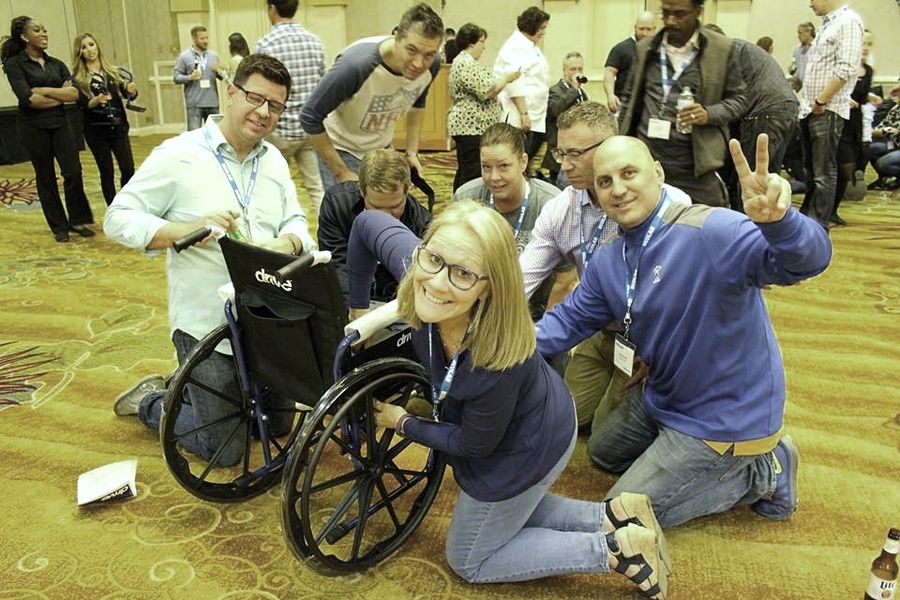Three Surprising Reasons CSR Has Become So Important in the Workplace

Corporate social responsibility (CSR) continues to gain popularity at companies large and small. Find out how giving back can positively impact your office environment, employee morale, and consumers’ perception of your organization and brand.
What does corporate social responsibility (CSR) really mean? And how can it help you work towards a vibrant workplace, with a healthy company culture, and happy consumers?
You can either read on to learn more, or listen in to our most recent podcast episode of Outback Talks: The Employee Engagement Podcast to hear from special guest, Olivia Jackson, an HR Coordinator at Outback Team Building & Training. In the interview, Olivia explains:
- What corporate social responsibility is
- Three reasons why CSR has become so important in recent years
- How you can create your own successful CSR program
What Exactly Is CSR?
CSR stands for “corporate social responsibility,” which is the integration of social and environmental concerns into a company’s business operations. Plainly speaking, this means that an organization does business in a way that supports charitable causes and the environment.
For example, LEGO was ranked number one in the Reputation Institute’s 2017 annual study of the top CSR companies around the world because consumers believe that the company:
- Behaves ethically
- Conducts business fairly
- Operates transparently
- Protects the environment
- Supports worthy causes
Three Reasons CSR Has Become So Important
64% of CEOs increased investment in corporate social responsibility in 2016, according to the Huffington Post.
But why?
Of course, corporate social responsibility can help your company make a difference by giving back to charitable causes and protecting the environment. Aside from the obvious, however, here are three reasons why businesses all over the world are incorporating CSR into their everyday business practices that may surprise you.
1. Your Customers and Employees Expect It
Companies are missing out if they’re not involved in CSR. Both consumers and employees have come to expect corporate social responsibility to be included in organizations’ business practices. More than 88% of consumers and 70% of Millennials believe that companies should be involved with CSR in some way, according to Forbes and TIME Magazine.
The Impact on Your Workplace:
With CSR, your organization has the opportunity to be innovative. You can help create a culture that employees are excited to be a part of, and offer products that consumers are eager to buy.
2. CSR Can Positively Affect Your Brand Image
Don’t hold a food drive or volunteer at a soup kitchen just for the sake of including something CSR-related in your company newsletter. Go above and beyond your customers’ and employees’ expectations. Try to incorporate CSR into your business practices in a way that’s relevant to your company’s core values, products, or services. This can be an authentic way to inspire people to buy from you or work for your company with pride.
The Impact on Your Workplace:
A brand that people are proud of can inspire loyalty. Loyalty can lead to more revenue. More revenue is good for both business and employee morale – and can help you give back even more!
3. It Can Help Promote Employee Engagement and Retention
According to the Huffington Post, Millennials are almost twice as likely to be happy with how their career is going if they frequently participate in workplace volunteer activities. When your company gives back, your team is also less likely to leave. “32% of employees would seriously consider leaving their job if their company gave no or little money to charity,” reports Forbes Magazine.
The Impact on Your Workplace:
Higher engagement and retention can provide your company with the obvious benefit of a more productive and efficient workforce.
— Olivia Jackson (HR Coordinator, Outback Team Building & Training)
“CSR makes good business sense. Both consumers and employees have come to expect it…Our CSR initiatives help us give back to our community, and on a larger scale. They also help positively impact our company culture. And, you know, when people are proud of where they work, they’re happy to tell their friends about the stuff that we’re doing.“
How to Create Your Own CSR Program
You don’t have to be a Fortune 500 company to make corporate social responsibility work for your business. Organizations large and small can make a difference with CSR. Olivia’s top tip for creating a successful CSR program is to identify your key stakeholders, and start by getting approval from the top down. Afterward, you should get company-wide buy-in, and make sure employees are interested in your program before moving forward. If you’re not sure how to get started, here are five ideas you can easily incorporate into your CSR program:
- Offer company-sponsored volunteer activities, such as an employee beach clean-up
- Produce or invest in renewable and clean energy, such as solar and wind power
- Partner with human rights organizations and non-profit groups
- Participate in charity team building activities that support non-profits, such as End-Hunger Games, Charity Bike Buildathon, or Wheelchairs for Charity
- Match employees’ donations of time or money to charities
For more details on how you can create your own CSR program, download your free copy of our eight-page guide: How to Build Your CSR Events Calendar.
Tune into the full interview above, or download the episode by subscribing to our podcast, Outback Talks: The Employee Engagement Podcast, on iTunes, Google Play, SoundCloud, Stitcher, or wherever you listen to your podcasts.




Comments